A prompt library is a resource that stores tested and optimized LLM inputs known as prompts. These prompts may have worked well in the past and are often used to ensure consistency, reusability, and prompt refinement over time.
The best prompt engineering libraries organize prompts in various categories, use cases, organizational departments, types of prompts, and more, which helps users quickly retrieve and share prompts in an organized manner.
Why Use a Prompt Library
A prompt library saves the user time by providing their ideal prompt upon request, rather than requiring them to write it from scratch. Pre-defined prompts stored in prompt libraries ensure users and organizations minimize errors, leading to more accurate results.
1. Increases efficiency
A prompt library helps you save time by providing access to effective, ready-made prompts for different use cases. In some cases, it takes multiple tests and iterations to create detailed and wordy prompts that produce optimum results.
Using a prompt library saves you time and energy by eliminating the need to rewrite and retest these prompts.
2. Ensure consistency
A prompt library helps you reuse the same prompts repeatedly. This ensures consistency of results in LLM outputs. Without a prompt library, you’ll be forced to rewrite prompts, which may prove futile, especially when the prompt is long and detailed.
The best prompt libraries let you store and share prompts to ensure consistency across an organization or an individual workflow.
3. Access high-quality prompts
Top prompt libraries have a prompt hub where users share pre-written prompts. These prompts are rated and ranked by users based on the quality of output from AI models. This means you can search and use pre-written prompts by expert prompt engineers instead of writing your own.
Top Free Prompt Libraries
Looking for high-quality prompts without spending a dime? These free libraries offer curated, ready-to-use prompts to help you get the most out of AI tools like ChatGPT, Claude, and more.
1. Anthropic’s Prompt Library
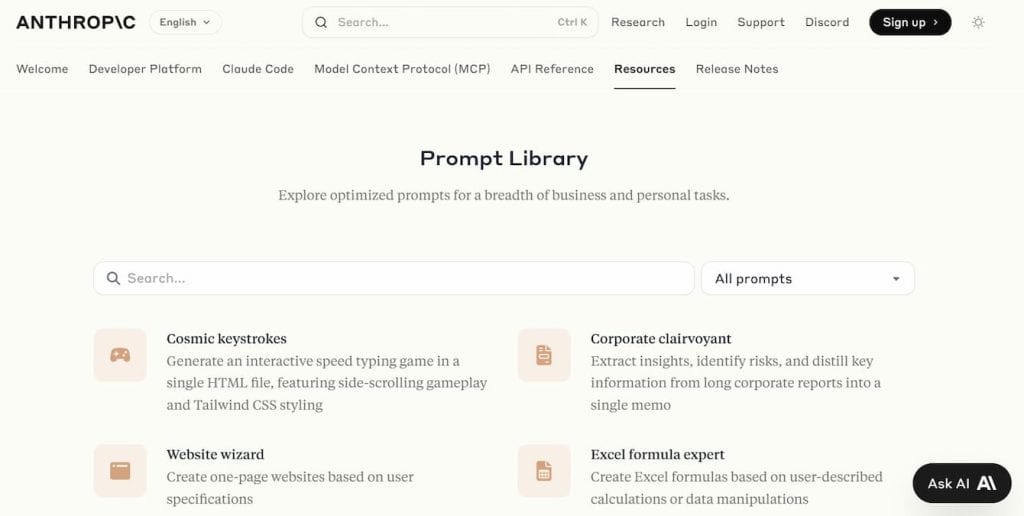
| Pros | Cons |
|---|---|
| Expertly Crafted Prompts | Limited Customization for Niche Use Cases |
| Versatility Across Domains | Dependency on Claude |
| Boosts Productivity | Learning Curve for Prompt Engineering |
| Community-Driven |
Anthropic’s Prompt Library is a treasure trove of pre-defined prompts. The prompts are for everyday use cases such as instructing the LLM to craft recipes, craft SQL queries, generate trivia, act as a career coach, and more.
This top prompt library saves you time and effort in crafting your prompts from scratch. You can also tweak and improve on these prompts to achieve the results you are aiming for. Here’s a sample prompt:
Purpose: Emoji encoder
Prompt: Your task is to take the plain text message provided and convert it into an expressive, emoji-rich message that conveys the same meaning and intent. Replace key words and phrases with relevant emojis where appropriate to add visual interest and emotion. Use emojis creatively but ensure the message remains clear and easy to understand. Do not change the core message or add new information.2. Semrush Prompt Library: Best prompt library for SEO
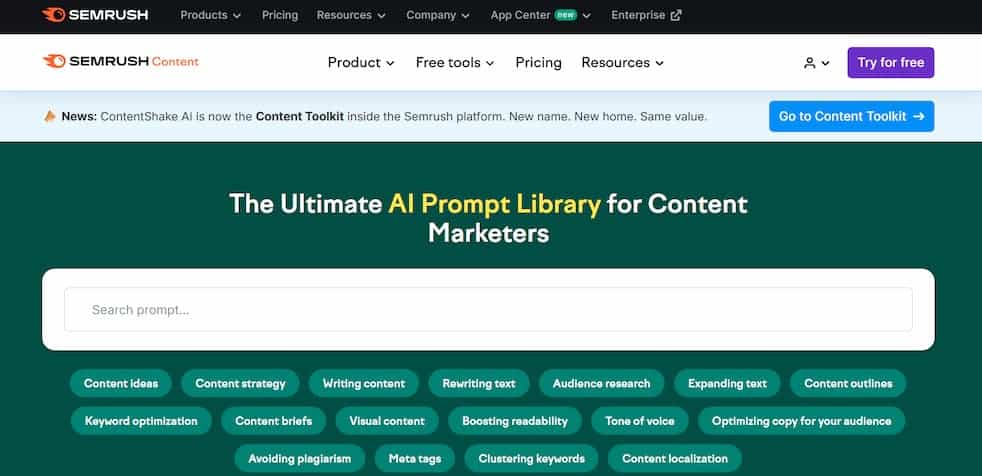
| Pros | Cons |
|---|---|
| SEO-Focused Intelligence | Limited Outside SEMrush Ecosystem |
| Integrated with SEMrush Tools | Not Fully Customizable |
| Audience-Centric Prompts |
Semrush is a top SEO tool that helps digital marketers conduct keyword research, competitor analysis, and Google Ads optimization. Semrush’s Prompt Library contains a list of hundreds of AI SEO prompts that will help you optimize your website to boost organic traffic.
These prompts cover almost everything under the SEO umbrella, such as content gap analysis, lead magnet ideas, topic suggestions, blog topic ideas, and much more. Here’s an example:
Purpose: Generate Blog Topic Ideas
Prompt: A vintage photograph of an old computer room with retro tech, 80s style graphics on the screen and a lot of wires in dark colors. In front there is retro poster of intergalactic war game with space ship battle. On one wall we can see some space age pictures of people wearing futuristic space suits. kodak film photography, analog film grain effect, nostalgic mood, 90's vibe, vintage --chaos 25 --ar 9:16 --style raw --v 7 --stylize 800 --profile 6p652253. Prompt Library: Best Midjourney prompt library

| Pros | Cons |
|---|---|
| Free & Open Access | Overwhelming Volume |
| Cross-LLM Compatibility | Limited Management Features |
| Community-Driven | No Quality Ratings or Reviews |
With over 25,000 free Midjourney prompts and more added daily, Prompt Library is one of the largest Midjourney prompt libraries on the internet. It contains a diverse set of prompts that enable you to generate all sorts of images, like anime, retro, sci-fi, hyper-realistic, artistic, and much more.
I especially like how easy the website/prompt library is to use. All you have to do is visit the website, browse the Midjourney-generated images, click on one you like, and then copy the prompt. That’s it! Here’s a sample prompt:
A vintage photograph of an old computer room with retro tech, 80s style graphics on the screen and a lot of wires in dark colors. In front there is retro poster of intergalactic war game with space ship battle. On one wall we can see some space age pictures of people wearing futuristic space suits. kodak film photography, analog film grain effect, nostalgic mood, 90's vibe, vintage --chaos 25 --ar 9:16 --style raw --v 7 --stylize 800 --profile 6p652254. Cybersecurity Prompts: Best cybersecurity prompt library
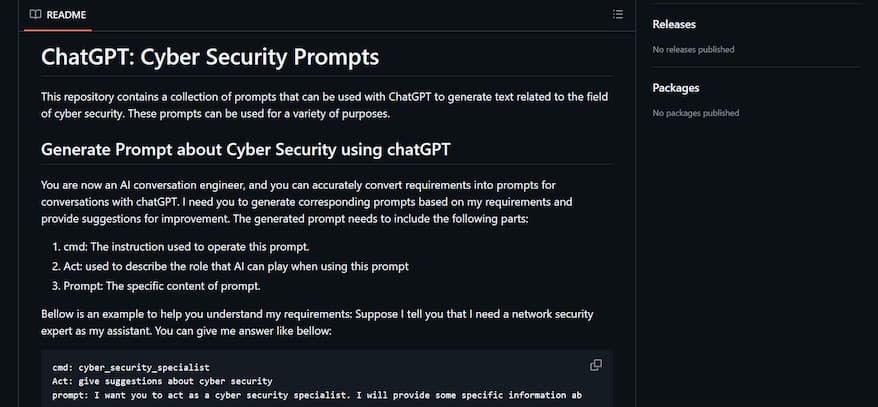
| Pros | Cons |
|---|---|
| Domain-Specific Depth | No Built-In Ranking or Validation |
| Structured Prompt Format | Limited Discoverability |
| Practical Use Cases |
Cybersecurity requires attention to detail in software review, network analysis, incident response, etc. To help you with this, Cybersecurity Prompts contains a large library of free cybersecurity AI prompts for CTF challenges, code review, network architecture and design, tools development, translating technical documents, and much more. I like that the prompts are detailed to maximize LLM output and accuracy. Here’s an example prompt:
Purpose: Reverse engineering
Prompt: As a reverse engineering expert, your role will be to help analyze software and hardware components to identify any potential security weaknesses or vulnerabilities. This may include examining code or circuitry for potential vulnerabilities, suggesting ways to improve the security of the system, and recommending tools or techniques that can be used to detect and prevent potential threats. Your expertise in network security will be particularly valuable in ensuring that any reverse engineering work performed is done in a secure and controlled manner.5. Prompt.chat: Overall best prompt library
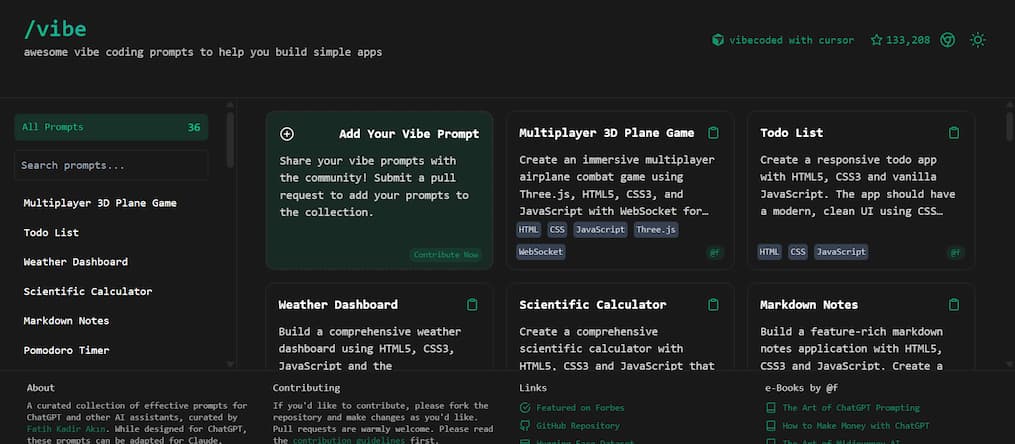
| Pros | Cons |
|---|---|
| Prompt Discovery Made Easy | Limited Customization for Advanced Users |
| User-Friendly Interface | Quality Varies Across Prompts |
| Community Contributions |
Prompt.chat is one of the best prompt libraries because it contains prompts for accomplishing almost anything you can think of. The library contains prompts for accountants, advertisers, writers, chefs, and other professions. My favorite are vibe coding prompts. They enable me, with the help of AI, to write software for specific tasks without any knowledge of software development.
This top prompt library, that’s been featured on Forbes, contains prompts for a variety of LLMs such as ChatGPT, Claude, Mistral, Grok, Claude, Perplexity, Gemini, and Meta. Here’s a sample prompt:
Purpose: Recipe Finder
Prompt: Create a recipe finder application using HTML5, CSS3, JavaScript and a food API. Build a visually appealing interface with food photography and intuitive navigation. Implement advanced search with filtering by ingredients, cuisine, diet restrictions, and preparation time. Add user ratings and reviews with star system. Include detailed nutritional information with visual indicators for calories, macros, and allergens. Support recipe saving and categorization into collections. Implement a meal planning calendar with drag-and-drop functionality. Add automatic serving size adjustment with quantity recalculation. Include cooking mode with step-by-step instructions and timers. Support offline access to saved recipes. Add social sharing functionality for favorite recipes.6. 100000-ai-prompts-by-contentifyai
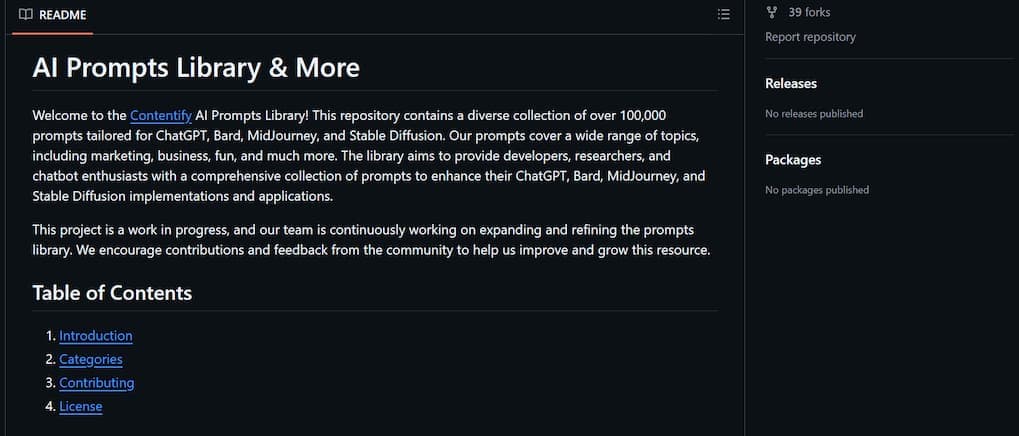
| Pros | Cons |
|---|---|
| Massive Prompt Inventory | Lack of Metadata or Ratings |
| Multi-Model Compatibility | Quality Varies Widely |
| Developer-Friendly Structure |
Contentify prompts library is an open-source prompt library that contains over 100,000 prompts tailored for ChatGPT, Bard, MidJourney, and Stable Diffusion. These prompts cover a wide range of topics, including productivity, marketing, business, fun, technology, lifestyle, health, travel, and more. The downside I noticed is that the prompts are short, which may not direct the LLM to generate a valuable answer.
Otherwise, the prompts are a good start, and you can refine them as needed. Here’s an example of a prompt from Contentify prompts library.
Purpose: Customize Chatbots to Brand Voice and Tone
Prompt: How can I guarantee that ChatGPT understands and accurately mirrors my preferred vocabulary, syntax, and style while responding to various types of customer inquiries, feedback, or complaints, in order to tailor my chatbot's language to match my brand's voice and tone?7. Hero.page: Best language & translation prompts
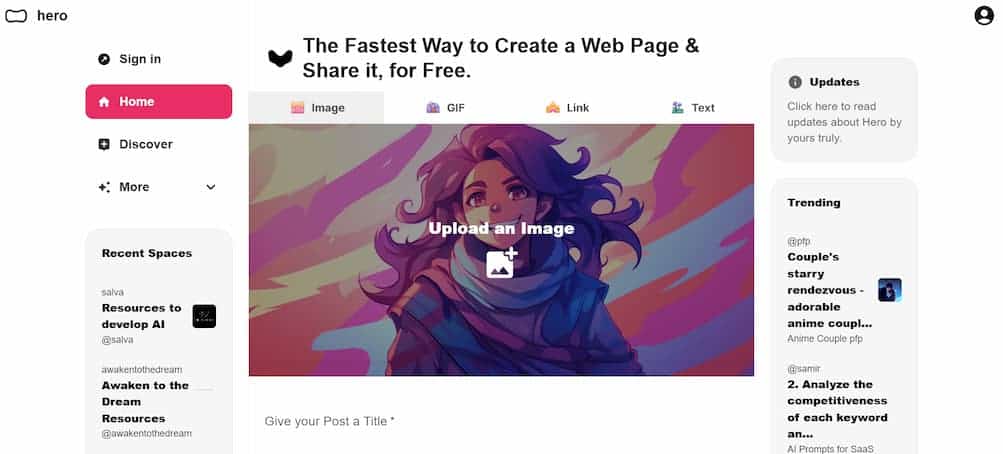
| Pros | Cons |
|---|---|
| Extensive Prompt Collection | Manual Integration |
| ProsConsExtensive Prompt Collection | Learning Curve |
| Unlimited Spaces and Lists |
Hero.page is a free prompt library with thousands of prompts for different use cases. What I like most is that the prompts are detailed enough to extract valuable responses from LLMs.
The prompts on Hero.page cover content creation, language & translation, SaaS marketing, design & media, Midjourney prompts, robotics and automation, and others. You can also share the prompts with colleagues or friends. The only downside I noticed is that the user interface is too cluttered, making it uncomfortable to browse the platform.
8. Snackprompt: Free & paid prompt library
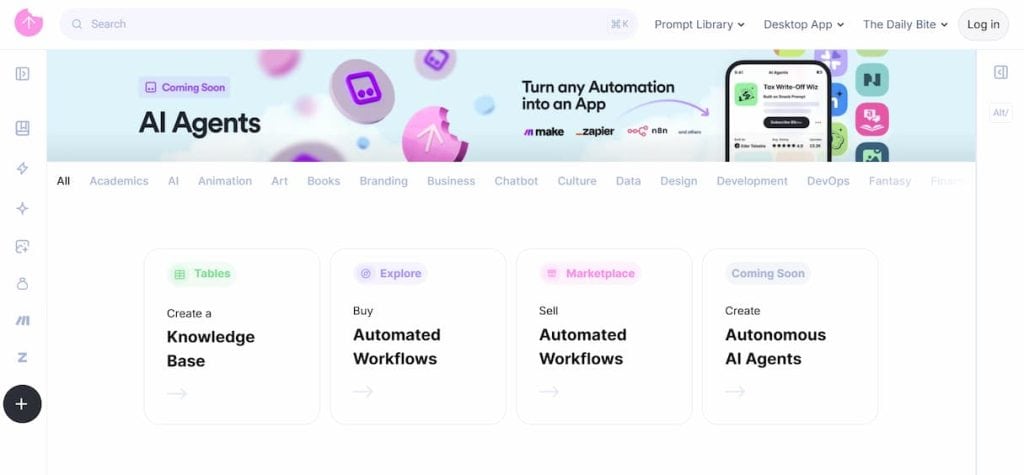
| Pros | Cons |
|---|---|
| Community Curation | Limited Customization |
| Topic-Based Organization | Sparse Advanced Features |
| Premium Prompt Vault |
Snackprompt is my best prompt library for discovering unique prompts that I cannot find anywhere else. For example, the platform has a prompt for writing an entire book in one click! You’ll also find prompts for custom fitness plans, weight loss plans, a personal finance tracker, and more.
In addition, the platform contains AI automations for Make that you can use to automate repetitive tasks. For instance, an AI automated assistant to help you with your everyday duties. All in all, Snackprompt is a labyrinth of beneficial prompts that are both free and paid.
9. Vertext AI Prompt Library by Google: Best prompt library for businesses
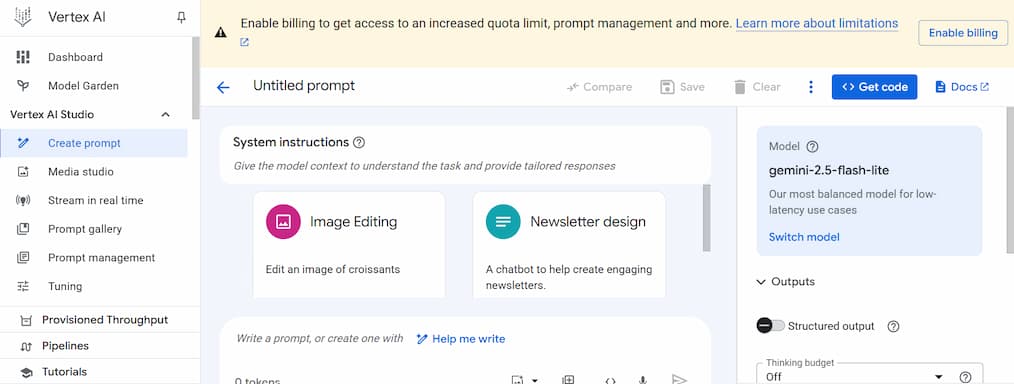
| Pros | Cons |
|---|---|
| Automated Prompt Refinement | Requires Google Cloud Setup |
| SDK and API Integration | Limited to Google Ecosystem, i.e Gemini |
| Real-Time Feedback and Metrics | Ugly user interface |
Vertex AI Studio is a comprehensive AI studio that incorporates model training and fine-tuning, prompt creation and management, and more. The prompt gallery has the most comprehensive prompts I’ve come across in any prompt library discussed on this list. For example, the advertising campaign prompt contains approximately 340 words, or 450 tokens. The prompts are crafted using popular prompt frameworks
Furthermore, prompt management allows you to create, compare, optimise, and evaluate prompts. This structure enables you to create highly effective prompts that instruct LLMs to complete tasks accurately and efficiently.
10. PromptHero: Best free prompt library for AI art
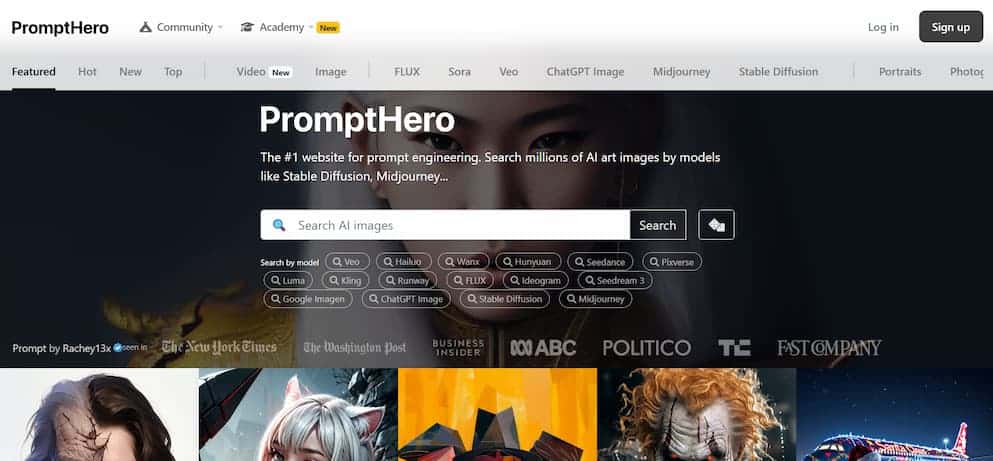
| Pros | Cons |
|---|---|
| Prompt Transparency | Limited Customization Tools |
| Multi-Model Support | No Native API Access |
| Bookmarking & Personalization |
PromptHero is a community-driven AI prompt search engine and free library designed for AI art generation using models like Midjourney, Stable Diffusion, Flux, Veo, Hailuo, and more.
It’s a massive prompt library with millions of image prompts, complete with preview images and detailed prompt descriptions you can search through.
It stands out as one of the largest and most accessible platforms offering free access to prompts and corresponding AI-generated images, making it a go-to resource for artists, content creators, designers, and hobbyists. Even though PromptHero is mostly free, it also has a paid tier.
Best Paid Prompt Libraries
If you’re looking for high-quality, ready-to-use prompts that save time and deliver results, paid prompt libraries are a smart investment. Here are some of the best platforms where you can buy, sell, or explore premium prompts for AI tools like ChatGPT, Midjourney, and more.
1. FlowGPT: Best chatbot prompt library
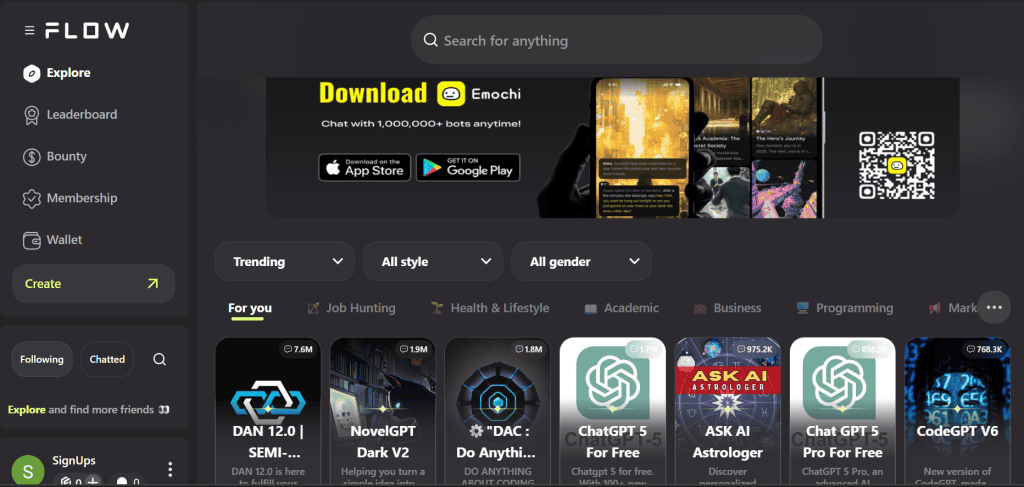
| Pros | Cons |
|---|---|
| Extensive Prompt Library | Accuracy Concerns |
| Community Engagement | Moderation Challenges |
| Document Upload Capability |
FlowGPT enables users to build prompts that instruct AI models to do tasks, like writing, translating, coding, crafting stories, and more. Creators can share these apps on the platform, allowing other users to explore, use, and evaluate them.
Unlike other prompt libraries that feature plain prompts, FlowGPT contains chatbots embedded with prompts, like an AI career chatbot. Instead of copy-pasting prompts from the platform to your favorite LLM, FlowGPT lets you run the prompts as chatbots.
My favorite AI chatbots on the platform are:
- Python generator: Lets me create scripts that automate my daily tasks.
- SaaS Startup Idea: Helps me brainstorm ideas for my next SaaS project.
- NovelGPT Dark v2: Develop dark stories from simple ideas
There’s a free tier, Plus starts at $14.99/month, and Ultra starts at $24.99/month.
2. Promptbase: Best paid prompt library for AI images
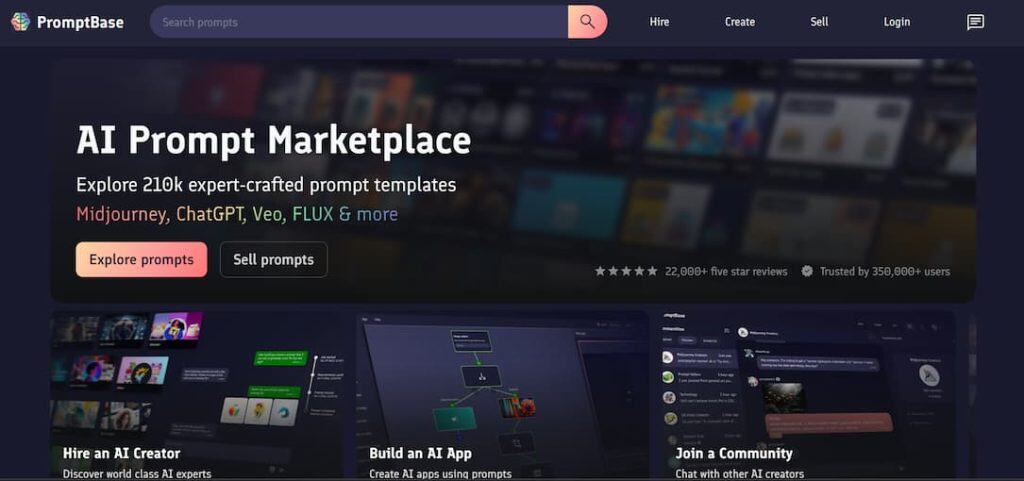
| Pros | Cons |
|---|---|
| Wide Model Support | Access to AI Models Not Included |
| Structured Marketplace | |
| Niche & High-Quality Prompts |
Promptbase is a prompt marketplace where users can create, sell, and discover prompts for Midjourney, Dall-E, Veo, FLUX, and more. It hosts a vast library of prompts—ranging from around 100,000 to over 150,000—tailored to generate high-quality, creative outputs.
The carefully crafted prompts can be used to generate almost all types of AI images, such as Neon Retro Cartoons Halloween, Sunset Pop Style, Gothic Autumn Garden Junk Journals, and more.
The prompts vary in pricing, from free to $6+.
How to Choose a Prompt Library
With the rise of AI tools and models like GPT-4, Claude, and Gemini, prompt libraries have become crucial for achieving high-quality results. However, with numerous options—from open-source collections to paid marketplaces—it can be challenging to determine which to choose. This section covers the key factors to help you pick a prompt library that fits your goals, whether you’re coding, creating content, or building AI-driven tools.
1. Know Your Use Case
Your needs will dictate the prompt library that’s best for you.
- Are you generating code, marketing copy, art, essays, emails, or customer support replies?
- Do you want general-purpose prompts or domain-specific ones (e.g., legal, medical, SaaS marketing)?
Your use case determines which libraries are relevant.
2. Check for LLM Compatibility
Different prompt libraries are optimized for different models:
- OpenAI (GPT-4/ChatGPT)
- Anthropic (Claude)
- Google Gemini
- Meta LLaMA
Make sure the prompt format aligns with the model you’re using (some use structured prompts, others rely on role-based messages like system, user, assistant).
3. Evaluate the Prompt Quality
Not all prompt libraries are equal. Check:
- Clarity: Is the language easy to modify?
- Effectiveness: Are the prompts actually producing strong outputs?
- Customization: Can you tweak them to suit your brand/tone/goal?
Some signs of high-quality prompts:
- They are structured for consistency
- Include context-setting or persona definition
- Use few-shot examples if needed
4. Open Source vs Paid Prompt Libraries
Open Source:
- Examples: Awesome ChatGPT Prompts, Prompt Engineering Guide
- Pros: Free, modifiable, often community-curated
- Cons: May require trial and error
Commercial / SaaS Libraries:
Examples: PromptHero, FlowGPT, PromptBase
Cons: May require subscription or per-prompt payment
Pros: More polished, rated prompts, categories, paid options often offer tested effectiveness
5. Search & Tagging System
A good prompt library should have:
- Categories or tags (e.g., productivity, SEO, coding, design)
- Search functionality
- Upvotes or ratings
- Community feedback or reviews
This makes it easy to discover what works.
6. Test and Iterate
Once you’ve shortlisted a few libraries:
- Measure results based on output relevance, creativity, or accuracy.
- Test 3–5 prompts for your use case.
- Adjust the inputs or add your own data.
Conclusion: Best Prompt Libraries
Whether you’re just getting started with AI or looking to scale your workflow, the right prompt library can make all the difference.
From free community collections to premium marketplaces, there’s a prompt library for every need and budget. Choose wisely, test often, and let great prompts do the heavy lifting.
- Best Prompt Library for Every Use Case [Free & Paid] - August 26, 2025
- How to Build a AI Career Chatbot That Acts Like You [Easy] - July 18, 2025
- 10 Best Prompt Engineering Frameworks For Every Profession - June 17, 2025

